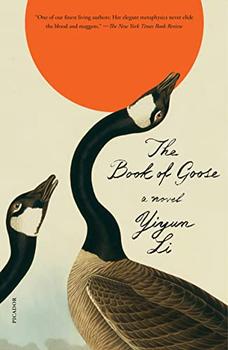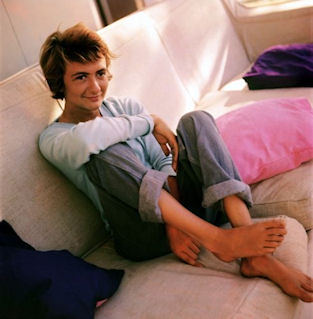Summary | Excerpt | Reviews | Beyond the Book | Read-Alikes | Genres & Themes | Author Bio

A Novel
by Yiyun LiThis article relates to The Book of Goose
 In Yiyun Li's novel The Book of Goose, narrator Agnès Moreau recollects entering a surprising phase as a 14-year-old author in post-World War II France when a book that she was secretly assisted in writing by her best friend, Fabienne, became a hit and a public curiosity. Fictional Agnès describes the real-life French author Françoise Sagan as her more successful successor, rising to fame after the luster of her own stardom had begun to dull: "That year a girl named Françoise Sagan, who was four years older than me, made her name in literary history. The fame of Agnès Moreau, the peasant girl who failed to be transformed into a debutante, was no more than a twinkle of a firefly compared to the meteoric splendor of Mlle Sagan."
In Yiyun Li's novel The Book of Goose, narrator Agnès Moreau recollects entering a surprising phase as a 14-year-old author in post-World War II France when a book that she was secretly assisted in writing by her best friend, Fabienne, became a hit and a public curiosity. Fictional Agnès describes the real-life French author Françoise Sagan as her more successful successor, rising to fame after the luster of her own stardom had begun to dull: "That year a girl named Françoise Sagan, who was four years older than me, made her name in literary history. The fame of Agnès Moreau, the peasant girl who failed to be transformed into a debutante, was no more than a twinkle of a firefly compared to the meteoric splendor of Mlle Sagan."
The year referred to is 1954, when Sagan published her debut novel Bonjour Tristesse (Hello Sadness) at the age of 18. While Agnès mentions Sagan in the above passage mainly in contrast with herself, their careers bear more in common than their youthful beginnings. Like Agnès, Sagan took a path to success that was strewn with novelty and controversy. Her first book was critically praised by some, but her age combined with her confidence as a writer created a stir, along with what was perceived as the amoral nature of the story, which features a sexually liberated young female protagonist in a dramatically engaging situation involving her widowed father and his romantic connections with two women. Faced with this work that mixed popular appeal and serious literary ambition, some critics suggested that it was probably written by an older, male writer, and marketed under the name of a teenage girl just to provoke interest.
Sagan was born Françoise Quoirez on June 21, 1935 in Cajarc, a town in Southern France. She became interested in literature at an early age, reading Proust, Camus, Gide and other authors. While spending a summer in Paris to study for her baccalaureat (the national exam French students take at the end of "lycée," or high school), she wrote Bonjour Tristesse, titled after a poem by Paul Éluard. The novel was picked up by the publisher René Julliard, and met with success soon after, selling 350,000 copies in France alone within two years and becoming an international phenomenon.
While this early literary achievement may have seemed like a fluke to some, Sagan continued to publish novels regularly over the next four decades, along with film scripts, plays, short stories and nonfiction. Her fame and financial success allowed her to live the life of a celebrity, which, like her books, was viewed with a mix of popular interest and scandal. She became known for her fondness of drinking, drugs, gambling and fast cars (including an Aston Martin in which she got into an accident in 1957 that resulted in bad injuries), as well as two short-lived marriages and many love affairs. She has been quoted as saying, "Money may not buy happiness, but I'd rather cry in a Jaguar than on a bus" and "Whoever has not thrilled to speed has not thrilled to life — or perhaps has never loved anyone."
Sagan died in 2004 at the age of 69, leaving a complicated and contradictory legacy. She remains both a controversial figure associated with promoting a shallow, idealistic view of France and an influential writer whose literary merit is respected by many. In an essay for the New Yorker in 2019, author Rachel Cusk praised Bonjour Tristesse and its follow-up, Un certain sourire (A Certain Smile), writing, "These two novels, so spare and rigorous, so artistically correct, so thorough in their psychological realism, are the highest expression of the triangular purity of their author's strange and beautiful esthétique."
Françoise Sagan, courtesy of Flickr
Filed under Books and Authors
![]() This "beyond the book article" relates to The Book of Goose. It originally ran in September 2022 and has been updated for the
August 2023 paperback edition.
Go to magazine.
This "beyond the book article" relates to The Book of Goose. It originally ran in September 2022 and has been updated for the
August 2023 paperback edition.
Go to magazine.
Your guide toexceptional books
BookBrowse seeks out and recommends the best in contemporary fiction and nonfiction—books that not only engage and entertain but also deepen our understanding of ourselves and the world around us.